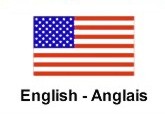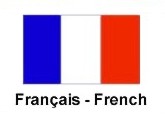Utleys visit Feves
Mr. and Mrs. Edwin Utley of Seine, France, and an interpreter visited Feves, France the first week in June. Mrs. Utley wrote a fine letter telling of their trip. We are sorry we don�t have space for the entire letter.
Friday, June 3 we met Mme. Bazin at her Champs Elysees office and we left Paris. We passed through Epirnay, the
home of the champaign Barons. At Verdun, we drove to the north where the French war dead of World War I are buried
at Ossuaraire, a monument that was erected by the United States containing the remains from those from nearby
battlefields. It was about four p.m. when we arrived at Feves, too late for a luncheon which was prepared for us. Mr.
Torlotting had planned a meeting of the school children, but we were too late for that too. There is no school on
Thursdays and Saturdays.
Mr. Torlotting and his wife met us on our arrival. The schoolmaster�s home is combined with the schoolroom and
town hall. To the back of the home is a courtyard where the children play on school days and one corner is occupied
by Mr. Torlotting�s chickens. Beyond the courtyard is Torlotting�s well-kept garden, about one acre. From the
balcony of their home one has a fine view of the Moselle valley. Fort St. Quentin, Metz, and to the left the
industrial village of Maizieres.
We were shown the parsonage and met the curate Mr. Louis Holveck, and his parents and were served the largest
strawberries we have ever seen, and cake. Most of the damage to the church has been repaired. The stained glass
windows had been stored in the basement by the Germans, so were not damaged.
We met Madame Francois Girard, 79, who had just returned from the fields with a basket of nettles on her back for the pigs. She
posed for a picture in her native Lorraine hat. It is similar to our sun bonnets, only the brim is wider and held
stiff in front by stiff slats of wood inserted in the brim. She wants a sheet for her bed.
The cattle were being brought from the fields at this time. There are 80 head of Holsteins, all in fine shape.
(Billie added she felt much at home now.) The few barns we visited had electric lights. The barns adjoin the houses
or are together in some cases.
We met one man who had been a prisoner at Dachau concentration camp. He weighed 80 pounds when released. At August
Berne�s we saw a McCormick-Deering binder of an old model.
The Torlottings, Madam Bazin and us were invited to the Emile Pierson�s to dine. Mr. Pierson was assistant mayor.
They have two sons in their twenties. One had a jacket with the name �Affolter� in it. Our dinner lasted from 9
to 12 and what a dinner. There was a good deal of conversation between courses, the friendship between Feves and
Morganville being the main topic. From them we learned the shipments were all put to use. They stressed that all
shipments should be sent direct to the committee at Feves, not to individuals to avoid French customs. We went on
a picture taking tour of the Girard�s and the Pierson�s.
We saw Chester White pigs. Everyone in the village attends church, so we took more pictures as they came out.
The mothers and children gathered in the school and we distributed items from the package Velma Carson sent and
some we had taken. The children sang several songs, one of them was Lorraine�s national anthem �Joan of Lorraine.�
As they left, they gave us a big �hip, hip, hurrah� and "Good bye" in English. Each one shook hands with us. A
lovely group of neatly dressed children and so perfectly trained.
It was pointed out to us there is no longer dire need except sugar, rice coffee and baby cereals. There is also a
great shortage of bed linens. Thin clothing is not suitable. There has been no clothing sent for older women. Most
of the older women wear black. We noted all the gardens were well kept. They have every fruit and lots of vegetables.
Mr. Torlotting pointed out the village of Semecourt about a mile away, which has less reparation from the
government than Feves, probably due to their not having an energetic person like Mr. Torlotting to plead for them.
No doubt they are worthy of adoption and it would help so much if some American town adopted them.
During our visit to Feves, we felt so much at home because there are much like the people of Morganville, warm
hearted, interested in their families, their fields and simple living.
It was hard to say good bye. The Torlottings accompanied us to the top of the hill. It was like parting with our
own people. Their morale is wonderful when one considers what they have been through. They explained we were received
as ambassadors of Morganville and the wonderful reception accorded us were directed to the people of Morganville
and not to us alone. Our next visit to Feves will be as friends. Never doubt their absolute sincerity about
friendship of Feves to Morganville. I do hope this will help make Feves a little clearer to all of you.
Sincerely,
Billie Utley
August 11, 1949
Morganville Tribune

